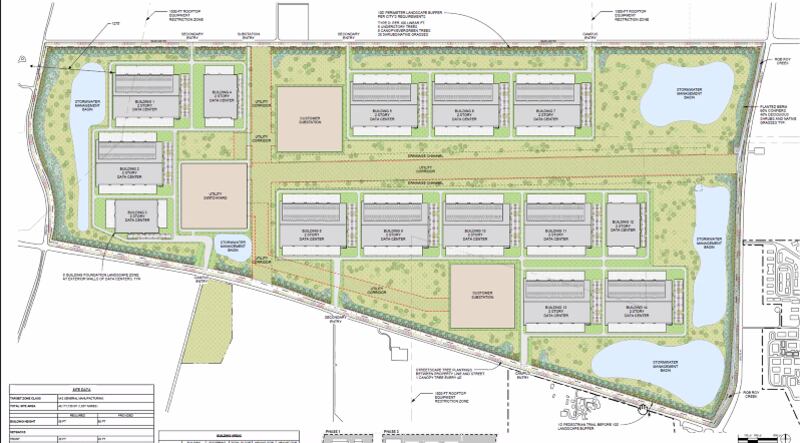Developers have altered the 1,037 acre Project Cardinal data center in Yorkville with greater setbacks and increased trees to ease the impact on neighboring residential areas.
The proposed 14 two-story data centers and two electrical substations are drawn up nestled between the Equestrian Estates subdivision and the Bristol Bay subdivision.
The campus site is northwest of Illinois Route 47 and Galena Road, south of Baseline Road, and east of Ashe Road.
“The placement and size of some of these features have been adjusted in response to some public feedback,” said Krysti Barksdale-Noble, community development director.
In construction Phase I, nearest Ashe Road, several of the warehouses have been set 500 feet further back from the roadway. This makes the total setback from Equestrian Estates near 1,200 feet.
In construction Phase II, a substation along Baseline Road has been set back an additional 300 feet from the roadway, making the total setback from the Bristol Bay subdivision 625 feet.
To help obscure the warehouses and to dampen the generated sound pollution, the developers want to plant an additional 450 trees in the landscaped berm, bringing the total amount of trees planted to more than 5,000.
The trees will be planted at a height of 6 feet, meaning they will take several years to fully mature and significantly block noise pollution.
During the Sept. 9 City Council meeting, Matt McCarron, representing the developers, Pioneer Development, LLC, said once completed the data center campus will be a windfall for the community.
“We are proposing to build a data center campus so there is sufficient tax revenue to enhance the school system, the parks, municipal services and more third spaces for the community’s benefit,” McCarron said during the meeting. “Our primary goal here is quiet, sustainable technology infrastructure designed to strengthen Yorkville, not redefine it.”
He said the project is anticipated to use 310,000 gallons of water per day at full build-out.
The average American household uses about 300 gallons of water per day, according to the U.S. Environmental Protection Agency. This means Project Cardinal at full build-out would use the same amount of daily water as 1,033 new homes.
The manufacturing sprawl and noise pollution remained a thorny issue for attending residents.
Resident John Joyce said he was worried the excess noise would diminish the quality of life for those around the designated site and that the warehouses and prolonged construction would decrease neighboring residential property values.
“As a citizen of Yorkville who is much further away from the data center, I do not want to benefit from the data center’s tax revenue if it’s at the expense of those who live next to the development,” Joyce said during the meeting.
Resident Alicia Castillo said by slating all 3,000 acres for data center development, the city is limiting itself from developments that could greater benefit the entire community.
“What you’re telling the residents is we’re going to build gigantic, permanent, hideous, loud developments that are the size of a subdivision and consume as much water as a subdivision, but will not produce the same kind of robust economic development that a subdivision, a recreation center, a homeless shelter or a school could,” Castillo said during the meeting.
Castillo said the community should have a greater say in how to develop the land through a diversified and balanced approach.
“I’m not really interested in watching a tech industry consume my hometown for the sake of earning a quick buck,” Castillo said.

:quality(70)/s3.amazonaws.com/arc-authors/shawmedia/0cef0bf9-a04e-4bb4-aea0-03d8ced01c00.jpg)